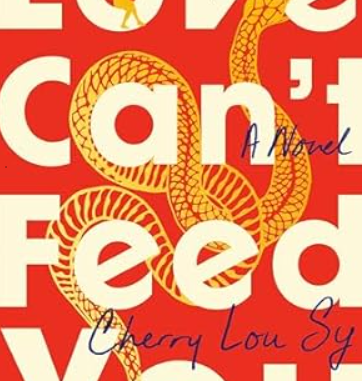
By Rami Mansi
In collaboration with the Brooklyn College Asian American, Native Hawaiian, and Pacific Islander (AANAPISI) Project (BCAP), The Wolfe Institute hosted an online conversation with BC master’s graduate and author Cherry Lou Sy. Moderated by BC English professor and author Helen Phillips, the conversation discussed Lou Sy’s debut novel “Love Can’t Feed You.”
The novel centers around the protagonist Queenie and her family immigrating to the United States from the Philippines. After seemingly settling in, the family soon faces a string of interconnected problems that cause Queenie to dive into discovering her identity and agency in this coming-of-age novel.
Hailing from the Philippines and settling in Brooklyn, Lou Sy received her bachelor’s degree from New York University and a master’s degree in playwriting from BC, where she now works as an adjunct lecturer. Lou Sy comes from a Filipino and Chinese ethnic background, a strong inspiration for her writing style. When discussing inspirations for her novel, Lou Sy discussed “The Lover” by Marguerite Daz, a tragic romance she read when she was younger that followed an interracial couple.
“I kept thinking about [“The Lover”] over and over again and then I basically superimposed my own parental figures in it? And then I thought, well, what if they had a child?” she said.
The setting of the book is a prominent storytelling device in which the characters traverse across the Philippines and New York, Lou Sy describes the locations extensively. The geography of New York is written to ground the reader into the setting, allowing the reader to see New York through the immigrant experience.
“I wanted to highlight a grittier New York that may not be in some other fiction that’s out there,” said Lou Sy.
Identity is at the core of this novel, including Queenie’s struggle with her overlapping identities and how it fit within the “American dream”–living a prosperous life in the U.S. For Queenie, the American dream has turned into an “American nightmare.” Assimilating into American culture means giving up parts of one’s identity to adapt to their surroundings, and developing new views on par with the culture.
“When people arrive here, they start to assimilate and part of that experience becomes real in the sense that this is not what I expected, the streets are not paved with gold,” Lou Sy said.
Lou Sy shifted to the discussion of human labor in the Philippines. One of her fears growing up was becoming a maid, not because of any malice behind the job, but because of the violence that surrounded being a domestic worker. Seeing how the world treated maids, Lou Sy connected that to her sense of self, developing insecurities from her ethnic background.
“I’m also both Chinese and Filipino, and there was sort of a lot of self-hatred that was coming up in the vein, the shame that this is as good as it gets. To go abroad your only value is to work for someone as their servant,” she said.
When asked why it was important to do this conference and share this book with college students, Loy Sy said that the intention was for readers of all backgrounds to connect with Queenie’s story.
“I did write [the book] specifically for […] the me in myself that was still a college student,” Lou Sy explained. “My hope is that [Love Can’t Feed You] becomes a portal for more dialogue.”
Students interested in reading the book can buy it online from Penguin Random Press.
